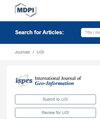Efficient and Verifiable Range Query Scheme for Encrypted Geographical Information in Untrusted Cloud Environments
IF 2.8
3区 地球科学
Q2 COMPUTER SCIENCE, INFORMATION SYSTEMS
引用次数: 0
Abstract
With the rapid development of geo-positioning technologies, location-based services have become increasingly widespread. In the field of location-based services, range queries on geographical data have emerged as an important research topic, attracting significant attention from academia and industry. In many applications, data owners choose to outsource their geographical data and range query tasks to cloud servers to alleviate the burden of local data storage and computation. However, this outsourcing presents many security challenges. These challenges include adversaries analyzing outsourced geographical data and query requests to obtain privacy information, untrusted cloud servers selectively querying a portion of the outsourced data to conserve computational resources, returning incorrect search results to data users, and even illegally modifying the outsourced geographical data, etc. To address these security concerns and provide reliable services to data owners and data users, this paper proposes an efficient and verifiable range query scheme (EVRQ) for encrypted geographical information in untrusted cloud environments. EVRQ is constructed based on a map region tree, 0–1encoding, hash function, Bloom filter, and cryptographic multiset accumulator. Extensive experimental evaluations demonstrate the efficiency of EVRQ, and a comprehensive analysis confirms the security of EVRQ.不可信任云环境中加密地理信息的高效可验证范围查询方案
随着地理定位技术的迅猛发展,基于位置的服务日益普及。在基于位置的服务领域,地理数据的范围查询已成为一个重要的研究课题,引起了学术界和工业界的极大关注。在许多应用中,数据所有者选择将地理数据和范围查询任务外包给云服务器,以减轻本地数据存储和计算的负担。然而,这种外包带来了许多安全挑战。这些挑战包括对手分析外包的地理数据和查询请求以获取隐私信息、不受信任的云服务器选择性地查询部分外包数据以节省计算资源、向数据用户返回错误的搜索结果,甚至非法修改外包的地理数据等。为了解决这些安全问题,并为数据所有者和数据用户提供可靠的服务,本文提出了一种高效、可验证的非信任云环境下加密地理信息范围查询方案(EVRQ)。EVRQ 基于地图区域树、0-1 编码、哈希函数、Bloom 过滤器和加密多集累加器构建。广泛的实验评估证明了 EVRQ 的效率,全面的分析证实了 EVRQ 的安全性。
本文章由计算机程序翻译,如有差异,请以英文原文为准。
求助全文
约1分钟内获得全文
求助全文
来源期刊

ISPRS International Journal of Geo-Information
GEOGRAPHY, PHYSICALREMOTE SENSING&nb-REMOTE SENSING
CiteScore
6.90
自引率
11.80%
发文量
520
审稿时长
19.87 days
期刊介绍:
ISPRS International Journal of Geo-Information (ISSN 2220-9964) provides an advanced forum for the science and technology of geographic information. ISPRS International Journal of Geo-Information publishes regular research papers, reviews and communications. Our aim is to encourage scientists to publish their experimental and theoretical results in as much detail as possible. There is no restriction on the length of the papers. The full experimental details must be provided so that the results can be reproduced.
The 2018 IJGI Outstanding Reviewer Award has been launched! This award acknowledge those who have generously dedicated their time to review manuscripts submitted to IJGI. See full details at http://www.mdpi.com/journal/ijgi/awards.
 求助内容:
求助内容: 应助结果提醒方式:
应助结果提醒方式:


